
Note: The product line known as "Shelly Qubino Wave" will now be referred to as "Shelly Wave". This name change will not impact the functionality of any devices. The only modification will be the use of the new name in all future documentation.
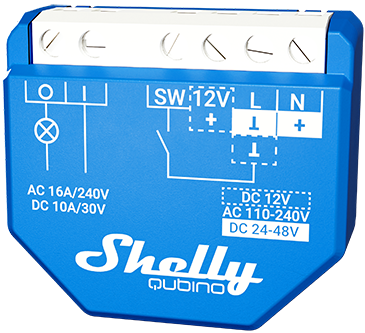
Device identification
Device: Wave 1 (EU)
EU Part number/Ordering Code: QNSW-001X16EU
Z-Wave Product type ID: 0x0002
Z-Wave Product ID: 0x0083
Z-Wave Manufacturer: Shelly Europe
Z-Wave Manufacturer ID: 0x0460
Terminology
-
Device - In this document, the term "Device" is used to refer to the Shelly Qubino device that is a subject of this guide.
-
Gateway (GW) - A Z-Wave(tm) gateway, also referred to as a Z-Wave(tm) controller, Z-Wave(tm) main controller, Z-Wave(tm) primary controller, or Z-Wave(tm) hub, etc., is a device that serves as a central hub for a Z-Wave(tm) smart home network. The term "gateway" is used in this document.
-
S button - The Z-Wave(tm) Service button, located on Z-Wave(tm) devices and is used for various functions such as adding (inclusion), removing (exclusion), and resetting the device to its factory default settings. The term "S button" is used in this document.
Short description
The Device controls on/off function for one electrical appliance, e.g., bulb, ceiling fan, IR heater, electrical locks, garage doors, irrigation system, etc. The output contact is potential-free (dry contact), so different power supply loads (up to 16 A) can be connected to the Device. It is compatible with push-buttons and switches (default).
Switch/push-button connected to input terminal SW (SW1)
If the SW (SW1) is configured as a switch (default), each toggle of the switch will change the output O (O1) state to the opposite state - on, off, on, etc. If the SW (SW1) is configured as a push-button in the Device settings, each press of the push-button will change the output O (O1) state to the opposite state - on, off, on, etc.
Switch connected to input terminal SW (SW1)
If the SW (SW1) is configured as a switch (default), each toggle of the switch will change the output O (O1) state to the opposite state - on, off, on, etc.
-
Change switch position once: Change the state of the output O (O1) state to the opposite state and send the command to the associated devices in associated groups 2 and 3 (check chapter Z-Wave Association).
Switch-memory connected to input terminal SW (SW1)
If the SW (SW1) is configured as a switch-memory, than:
-
Switching to Close switch-memory contact: Change the state of the output state O (O1) to the On state and send command to the associated devices in associated groups 2 and 3 (check chapter Z-Wave Association)
-
Switching to Open switch-memory contact: Change the state of the output state O (O1) to the Off state and send command to the associated devices in associated groups 2 and 3 (check chapter Z-Wave Association)
Push-button connected to input terminal SW (SW1)
If the SW (SW1) is configured as a push-button in the Device settings, each press of the push-button changes the output state O (O1) to opposite - ON, OFF, ON, etc.
-
Single press: Change the state of the output state O (O1) to the opposite one and send command to the associated devices in associated groups 2 and 3 (check chapter Z-Wave Association)
-
Double press: If the delay between first in second press is less then 500ms, this is interpreted as double press. Send command to the associated devices (dimmers, shutters,....) in associated groups 2 and 3 (check chapter Z-Wave Association)
-
Press and hold: Send command to the associated devices in associated group 3 (check chapter Z-Wave Association)
-
Release: Send command to the associated devices in associated group 3 (check chapter Z-Wave Association)
Main applications
-
Residential
-
MDU (Multi Dwelling Units - apartments, condominiums, hotels, etc.)
-
Light commercial (small office buildings, small retail/restaurant/gas station, etc.)
-
Government/municipal
-
University college
Integrations
Shelly Qubino Wave devices are developed on the world's leading technology for smart homes - Z-Wave(r).
This means Shelly Qubino Wave works with all certified gateways supporting Z-Wave communication protocol.
To make sure the functions of Shelly Qubino Wave products are supported on your gateway, we are regularly executing compatibility tests of our devices with different Z-Wave gateways.
Simplified internal schematics
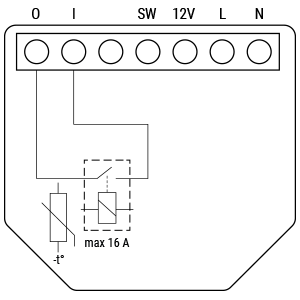
Device electrical interfaces
Inputs
-
1 switch/push-button input on screw terminal
-
1 potential-free contact relay input on screw terminal
-
3 power supply inputs on screw terminals: N (+), L () and 12V
Outputs
-
1 potential-free contacts relay output on screw terminal
Connectivity
Z-Wave - Unsecure, S0 Security, S2 Unauthenticated Security, S2 Authenticated Security
Safety features
Overheat protection
-
switch off its own relay
-
sends the Notification Report to the Gateway (Overheat detected)
-
the led lights react as specified above (check blinking mode for Overheat detected)
Any of next activities reset this alarm: power cycle, short press on S button, press any switch-push button connected to any SW (SW, SW1, SW2, ...) terminal.
NOTE: The Overheat protection is always active and cannot be disabled.
Additional description above under chapter Notification for Overheat detected.
Supported load types
-
Resistive (incandescent bulbs, heating devices)
-
Capacitive (capacitor banks, electronic equipment, motor start capacitors)
-
Inductive with RC Snubber (LED light drivers, transformers, fans, refrigerators, air-conditioners)
User interface
S button and operating modes
-
Settings mode:
Is required to start the desired procedure, for example: adding (inclusion), removing (exclusion), factory reset, etc. It has a limited operating time. After completing the procedure in Setting mode, the Device automatically switches to Normal mode.
-
Entering Setting mode:
-
Press and hold the S button on the Device until the LED turns solid blue.
-
An additional quick press on the S button changes the menu in an infinite loop.
-
The Menu LED status has a timeout of 10s before entering again into Normal mode.
-
S button's functions
-
Manually adding the Device to a Z-Wave network
-
Manually removing the Device from a Z-Wave network
-
Factory Reset the Device
LED Signalisation
LED blinking modes
Specifications
|
Power supply |
110-240 V AC / 24-48 V DC / |
|
Power consumption |
< 0.3 W |
|
Max. switching voltage AC |
240 V |
|
Max. switching current AC |
16 A |
|
Max. switching voltage DC |
30 V |
|
Max. switching current DC |
10 A |
|
Overheating protection |
Yes |
|
Distance |
Up to 40 m indoors (131 ft.) (depends on local condition) |
|
Z-Wave(r) repeater |
Yes |
|
CPU |
Z-Wave(r) S800 |
|
Z-Wave(r) frequency band |
868,4 MHz |
|
Maximum radio frequency |
< 25 mW |
|
Size (H x W x D) |
37x42x16 +-0.5 mm / 1.46x1.65x0.63 +-0.02 in |
|
Weight |
26 g / 0.92 oz. |
|
Mounting |
Wall console |
|
Screw terminals max. torque |
0.4 Nm / 3.5 lbin |
|
Conductor cross section |
0.5 to 1.5 mm2 / 20 to 16 AWG |
|
Conductor stripped length |
5 to 6 mm / 0.20 to 0.24 in |
|
Shell material |
Plastic |
|
Color |
Blue |
|
Ambient temperature |
-20degC to 40degC / -5degF to 105degF |
|
Humidity |
30% to 70% RH |
|
Max. altitude |
2000 m / 6562 ft |
Basic wiring diagram
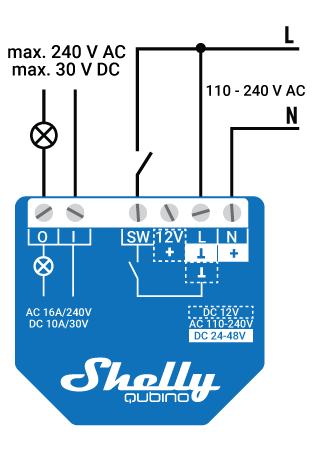
AC power supply
|
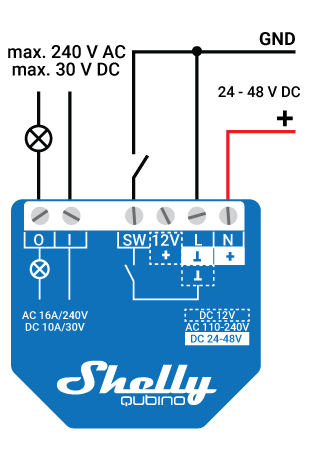
24 - 48 VDC power supply
|
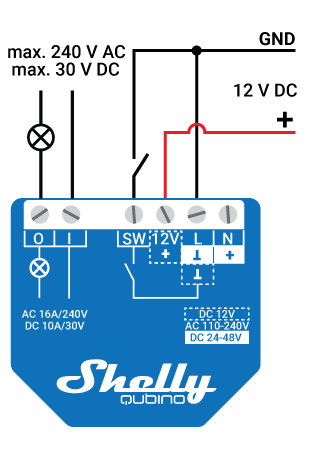
12 VDC power supply
|
Legend
|
Terminals |
|
Cables |
|
|---|---|---|---|
|
N |
Neutral terminal |
N |
Neutral wire |
|
L |
Live terminal (110-240 V AC) |
L |
Live (110 - 240 VAC) wire |
|
SW |
Switch/push-button input terminal (controlling O) |
+ |
12 / 24 - 48 VDC positive wire |
|
I |
Load circuit input terminal |
GND |
12 / 24 - 48 VDC ground wire |
|
O |
Load circuit output terminal |
|
|
|
12V+ |
12 V DC positive terminal |
|
|
|
+ |
24 - 48 VDC positive terminal |
|
|
|
|
12 / 24 - 48 VDC ground terminal |
|
|























